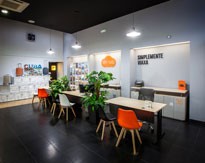Five interesting facts about the Galician coastline that you might not know about

Galicia has a lot to offer and even more if we talk about the coast. From Fisterra to Baiona and from Ribadeo to Ortigueira, with almost one thousand five hundred kilometers of extension, visitors can be amazed with the shape of its estuaries, delight with the numerous lighthouses and sunbathe or stroll along its wonderful beaches. But we want to go a little further: today we discover five facts you may not have known about the Galician coastline.
Mar de Ardora
The sight of a sea on fire sounds like science fiction but it is a much more common phenomenon than you might think. Due to the presence of microscopic algae called Noctiluca Scintillansque, the salty waters can flash when waves break or any other type of movement occurs. This is known as Mar de Ardora, a process of bioluminescence that we can enjoy in Galician waters.
Some of the beaches that surprise us with this phenomenon are the beach of Carnota, the beach of Os Riás (Malpica), the beach of Balarés (Ponteceso), the beach of Rebordelo (Cabana de Bergantiños) or the beach of O Ézaro (Dumbría).
Arousa and its estuary of records
According to data from Mexillón de Galicia, Protected Designation of Origin and binding element of the bateeiro sector, there are more than three thousand bateas in Galicia. To be specific, 3,387 platforms distributed in the estuaries of Ares-Betanzos, Muros-Noia, Arousa, Baiona, Pontevedra and Vigo.
Galician mussels need seventeen months to reach their commercial size (70-95 mm), a much longer cultivation period than in other European waters, which need two to six times longer. On the other hand, if we talk about an estuary that stands out for its cultivation, it is the Arousa estuary, which has about 70% of the Galician rafts. Thus, its waters boast 2,319 platforms for the cultivation of this mollusk. And this, possibly, has its reason for being the largest estuary in Spain, with more than 230 square kilometers of extension.
The beach of Teixidelo and its black sand
A few kilometers from San Andrés de Teixido and in the middle of Serra da Capelada is one of the most unique beaches in the world. It is believed that Teixidelo beach is the only one in the world formed by black sand of non-volcanic origin. This sand is the result of the erosion of black rocks, called ultramafic, which are composed of more than 90% of basic minerals such as magnesium, silicon or iron.
It is located at the base of one of the most impressive cliffs in Galicia (and the world), those of Vixía de Herbeira, and can only be accessed at low tide.
From landfills to idyllic locations: this is the beach of the crystals of Laxe
To the west of Cabo de Laxe, in the Baleeira inlet, is this peculiar beach. Like that of Teixidelo, its sand is not the usual.
The place was used for a long time as a garbage dump. But nature is wise and creates beauty. After a process of erosion at the hands of the force of the sea and wind, glass waste that were generated in that enclave were transformed into a sand of various colors and shapes that now attracts the attention of its many visitors. Of course, if we decide to take a souvenir of the beach we can face fines.
The peculiarity of the Vixía de Herbeira cliffs
The beginning of the cliffs of Vixía de Herbeira, between Cariño and Cedeira, coincides with the highest peak of the A Capelada mountain range. In fact, this unusual phenomenon makes that, with its 615 meters of altitude, are the highest cliffs in continental Europe and the fourth in Europe after those of Hornelen, Cape Enniberg and Croaghaun.
At its highest point we will find the garita de Herbeira, an old stone construction, dating from the eighteenth century, which was part of a set of coastal and maritime surveillance posts.
The Galician coast is a good place to start (re)discovering Galicia and we will resume our excursions to the Rías Baixas in April. Are you up for it? Do not hesitate to ask for information at 698 186 670 or at info@simplygalicia.es.


Comentarios
Deje su comentario